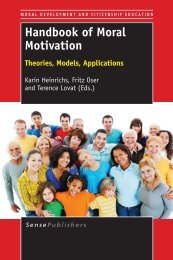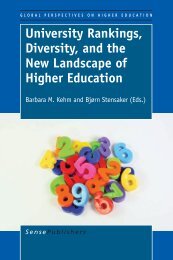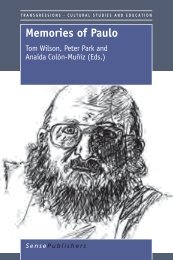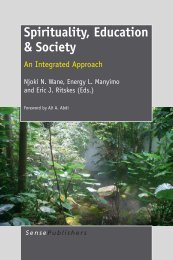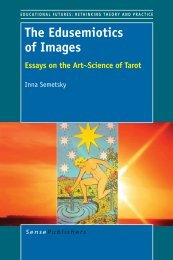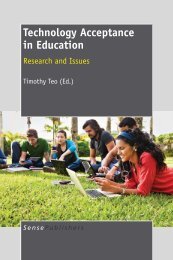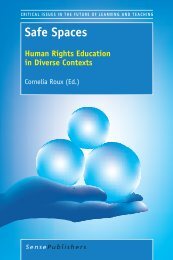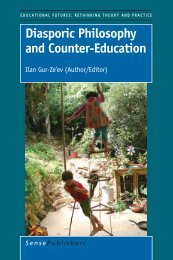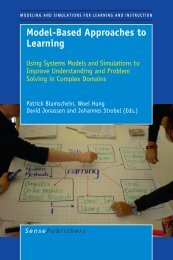Rupturing Concepts of Disability and Inclusion
Rupturing Concepts of Disability and Inclusion
Rupturing Concepts of Disability and Inclusion
You also want an ePaper? Increase the reach of your titles
YUMPU automatically turns print PDFs into web optimized ePapers that Google loves.
PROLOGUE<br />
which caused us tremendous concern <strong>and</strong> that was the church’s insistence that<br />
these 4 to 5 people could not be included with their peers in Sunday School. They<br />
had to be in a ‘special class’ with a ‘special teacher’; <strong>and</strong> this special class just<br />
happened to be made up only with these particular 4 to 5 people. This caused us a<br />
lot <strong>of</strong> heartache <strong>and</strong> prolonged discussion. However, it was one battle we would<br />
not win; so the only acceptable outcome for us was to go to another Uniting<br />
Church where we were not subjected to such restrictions.<br />
Another memorable event was the birth <strong>of</strong> our first-born son after being with the<br />
children 18 months. I distinctly remember the stares <strong>of</strong> people when I would go out<br />
shopping etc. Their looks spoke the words, “The poor thing. Four like that, <strong>and</strong><br />
she’s trying again!” Pregnancy, birth <strong>and</strong> breastfeeding weren’t just new experiences<br />
for me as a mother. It was the first time for everyone. Our son, Luke, was born<br />
with bright red hair, a considerable talking point amongst all who saw him. But no<br />
comments were as poignant as the questions Desmond asked. Peering in through<br />
the nursery window, he turned <strong>and</strong> asked, “How is his hair going to grow? Do we<br />
have to water it every day?” What seemed to be ludicrous questions, perhaps<br />
encapsulated the particularity <strong>of</strong> his life. Brought up in a ‘hospital ward for<br />
h<strong>and</strong>icapped children’, there had been no exposure to ordinary family activities<br />
such as being with babies; nor had there been any one person who could tell him<br />
stories from his own babyhood. There were no anecdotes; there were no photographs;<br />
<strong>and</strong> there was no knowledge <strong>of</strong> how a baby’s hair grows!<br />
Everyone loved Luke. Wally was absolutely enthralled with a baby in the house.<br />
Luke became a great playmate. Trudy loved feeding him, cooing in her dulcet<br />
tones <strong>of</strong> “Are you hungry, Baby? Here. You have it!” It was during the pregnancy<br />
<strong>and</strong> afterwards, that we could note some distinct differences between Trudy <strong>and</strong> the<br />
others. Having lived with her family for the first 6 years <strong>of</strong> her life, she appeared to<br />
be much more aware <strong>of</strong> others; <strong>and</strong> showed a degree <strong>of</strong> compassion <strong>and</strong> care<br />
simply not there with the boys.<br />
As Luke turned 2 years old, there were some other events which brought their<br />
own idiosyncrasies. Roslyn, aged 10, came to live with us from the children’s unit.<br />
This commenced another ‘it doesn’t matter’ experience as Roslyn had a persistently<br />
runny nose. We were battle-hard by this stage, so within 6 months she had ear,<br />
nose <strong>and</strong> throat surgery to correct the problem.<br />
Friends <strong>and</strong> relatives were starting to subtly suggest that it was not in the best<br />
interests <strong>of</strong> Luke’s developmental well-being for him to be in a house with 5 others<br />
with intellectual disability – views that we would readily dispute if anyone said<br />
them openly. However, by this time, I was pregnant with our second child, <strong>and</strong> it<br />
looked like the purely heavy emotional <strong>and</strong> physical dem<strong>and</strong>s could not be<br />
sustained with 2 small children; so we made the very difficult decision that we<br />
would have to resign with Kate’s birth. And this is indeed what happened.<br />
However, the time leading up to the point <strong>of</strong> separation was made harder with<br />
Trudy’s health taking more uncertain turns. Her diabetes had been fairly stable<br />
since the diagnosis <strong>of</strong> Coeliac Disease, with very few hypoglycaemic attacks.<br />
However, out <strong>of</strong> this stability came about four months <strong>of</strong> life-threatening difficulties.<br />
Numerous times, we were wakened during the night to hear her thrashing around<br />
xxiv




